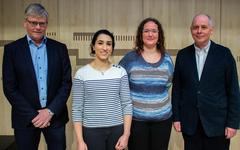Nedaa Asbah and Louise Poley with the ATLAS spokesman Karl Jakobs and the ATLAS collaboration board chair Max Klein. Image: DESY
Physics would not be such a productive field if it weren’t for all the bachelor, master and PhD students who build detectors and analyse data, especially in experiments in particle physics. The collaborations at the Large Hadron Collider (LHC) at CERN in Geneva recognise outstanding contributions through thesis awards. Nedaa Alexandra Asbah and Luise Poley, two former PhD students from DESY, today received awards for their theses from the ATLAS collaboration that runs the gigantic ATLAS detector at CERN.
Luise Poley, who was a member of the ATLAS group in Zeuthen, is now Chamberlain Fellow at Lawrence Berkeley National Lab in the United States. She continues her work on the upgrade of one of the innermost subdetectors of the ATLAS detector, the inner tracker, which was also the subject of her PhD thesis. Nedaa Alexandra Asbah wrote her thesis on the production of Higgs particles in association with top quarks decaying into a pair of bottom quarks. She started a postdoc position at Harvard University in the US in May, working on data from the LHC as well as on the upgrade of ATLAS.
The ATLAS Collaboration is a gigantic technological and human undertaking, consisting of more than 5500 people in over 180 institutions all around the world. They all contribute to the detector’s design, construction, operation, maintenance, data-taking and data analysis. Almost one fifth of these people are PhD students. A dedicated committee selects up to six awards every year to recognise outstanding contributions to the collaboration. Many of these traditionally go to theses about data analyses, and the DESY ATLAS group is particularly pleased that this time one of the awards is for a thesis about detector physics.
The LHC is currently standing still for a planned upgrade. Over the course of the next years, several components of the accelerator and the detectors will be replaced or refurbished to prepare for operation at higher energy and a much higher data rate. DESY is playing a key role in developing and building detector parts for both the ATLAS and the CMS experiments in its new Detector Assembly Facility.








